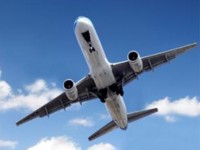Chinese airlines "will not cooperate" with EU emissions trading
 China’s largest airlines are set to flout EU law by refusing to pay for the emissions impact of flights in and out of Europe.
China’s largest airlines are set to flout EU law by refusing to pay for the emissions impact of flights in and out of Europe.The EU directive compelling all carriers to buy permits in the emissions trading scheme (EU ETS) survived a legal challenge by US airlines and came into force at the beginning of this year
A threatened lawsuit from China has yet to appear, but the China Air Transport Association (CATA), which represents the country’s four major airlines, today outlined a policy of non-compliance.
“China will not co-operate with the European Union on the ETS, so Chinese airlines will not impose surcharges on customers relating to the emissions tax,” CATA deputy secretary-general Cai Haibo told news agency Reuters.
Brussels has faced criticism for its decision to go it alone when the industry would prefer a global solution to cutting aviation’s current contribution to global emissions – about three per cent – and its projected future growth.
But the European Commission has consistently refused to back down in the face of pressure from China and the US to exclude non-EU airlines and has indicated it will impose financial penalties of up to €100 per tonne of CO2 or even ground non-compliant carriers.
“From our point of view it is quite simple,” a spokeswoman for EU climate commissioner Connie Hedegaard told BusinessGreen, “there is a law and we expect people to follow it.”
However, the EU will be wary of sparking trade wars with China and the US that could result in retaliatory legislation – there is already a bill in the US senate that would preclude the country’s carriers from participating in emissions trading, while Secretary of State Hillary Clinton has written to the Commission warning the US will “be compelled to take appropriate action” if the charges are not postponed.
The row surrounding the policy escalated this week when Lufthansa said participating in the ETS would cost the company an extra $130m this year, which would primarily be covered by hikes in ticket prices. And Delta Air Lines said on Tuesday it will add a $3 surcharge each way for trans-Atlantic tickets purchased in the US in order to offset the cost of the ETS.
But green campaigners have backed the EU’s stance, claiming that airlines will receive 85 per cent of the permits they need in the first year for free and should use such windfall profits to invest in more efficient aircraft and low-carbon fuels.
Supporters of the move argue that in the absence of progress towards a global deal at the International Civil Aviation Organisation (ICAO) the EU’s regional approach is necessary and will save around 183 million tonnes of CO2 each year by 2020
You can return to the main Market News page, or press the Back button on your browser.

